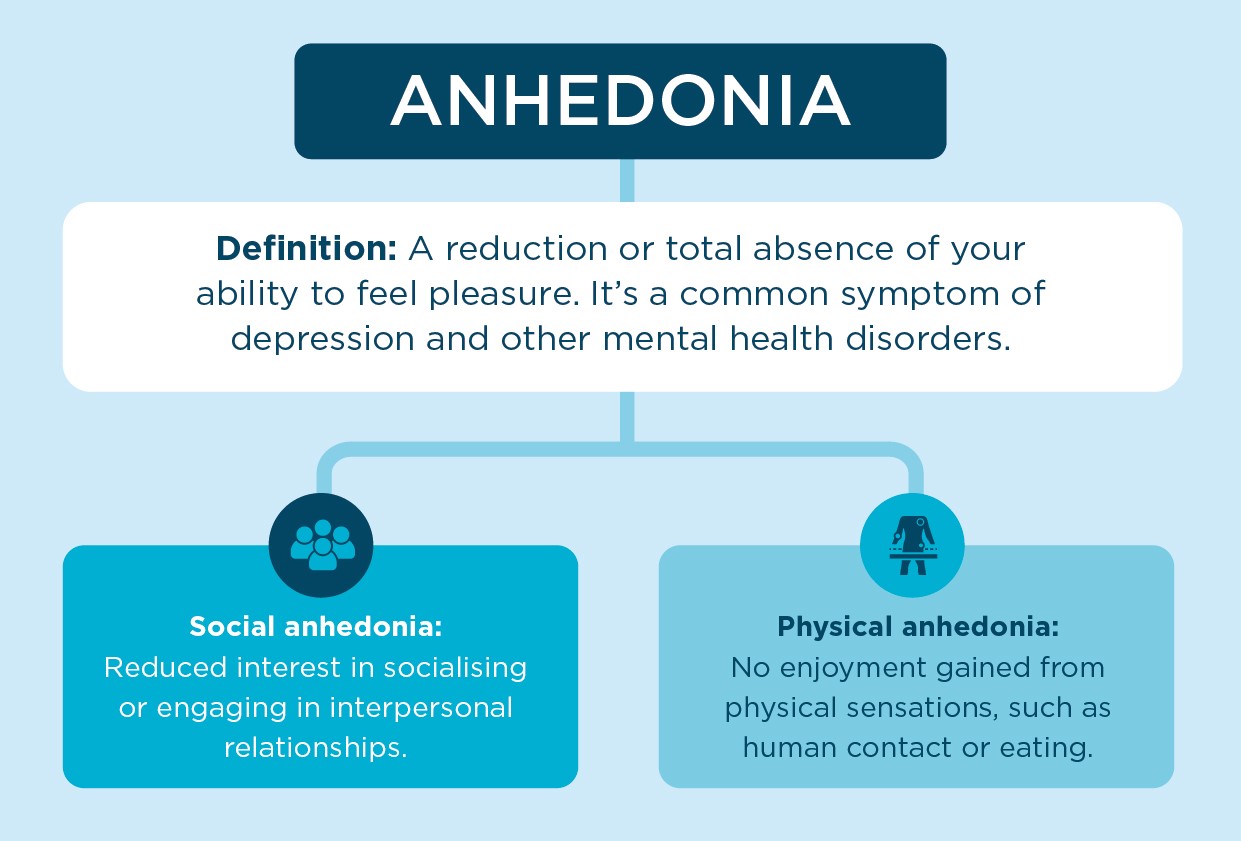Anhedonia: why don’t I feel pleasure anymore?
We explain the symptoms, causes and more behind anhedonia – a decrease in your ability to feel pleasure.
We explain the symptoms, causes and more behind anhedonia – a decrease in your ability to feel pleasure.



Anhedonia is a reduced level of interest in activities you used to enjoy, and a decline in your ability to feel pleasure. Anhedonia is a common symptom of many types of depression, but it can also be experienced by people with other mental health issues. It can even be felt by people who have no diagnosed mental health condition.
Some areas of relevant research, like this article in the journal of the Belgian Association for Psychological Science, suggests there are two main strands of anhedonia:

Some people with social anhedonia could have social anxiety disorder, but they are separate things. Symptoms of social anxiety are driven by a fear of social situations, whereas people with anhedonia find that they gain no reward or enjoyment from engaging with people socially.
Read on to find out about the symptoms, causes and treatment options for people struggling with anhedonia.
The symptoms of anhedonia include:
Anhedonia can apply to many different aspects of life, so long as you notice a decrease in pleasure from that activity or have much less motivation to engage in it at all.
Here are some examples of how anhedonia might affect someone in their everyday life:
Anhedonia is often a symptom of depression, but it has been commonly linked to other mental health disorders like bipolar disorder or schizophrenia. There’s also evidence that suggests people who have experienced a serious trauma in their life and are suffering with post-traumatic stress disorder (PTSD) may struggle with anhedonia.
It’s also known to occur in people with some physical health conditions like Parkinson’s disease, diabetes or issues with substance abuse. If you have one of these conditions, it’s likely to be contributing to your anhedonia.
Research is ongoing, but the science suggests that changes in brain activity may be the underlying cause of anhedonia. A study in the Dialogues in Clinical Neuroscience journal supported the idea that anhedonia is linked to a deficit of activity in the ventral striatum (a subcortical brain region) and an excess of activity in the ventral region of the prefrontal cortex. These areas of the brain are heavily involved in the signalling of reward and the release of the ‘feel good’ chemical, dopamine.
Anhedonia can be difficult to treat as a standalone issue, given that it often comes as a result of other mental or physical health disorders. This means that treatment will be more focused on underlying or associated conditions.
For example, if your anhedonia is related to depression, treatment will focus on improving your depression with the hope that your anhedonia decreases alongside it. Effective treatments for depression include talking therapies like cognitive behavioural therapy (CBT), or medication like selective serotonin reuptake inhibitors (SSRIs) – a type of antidepressant.
As anhedonia can be linked to physical or mental health, the best place to start if you think you have it, is to speak to your GP. They can rule out a medical cause and run other tests that might be contributing to your symptoms. For example, vitamin D deficiencies and thyroid problems commonly contribute to people struggling with depression symptoms.
They'll also ask you questions about your symptoms, general mood and lifestyle – such as any history of drug use. This can help them get a picture of what might be driving your anhedonia. Your GP can then help to outline the best next steps for you.
If the underlying issue is a mental health issue, you could reach out to a mental health professional or provider of mental health treatment services like Priory. We can diagnose any underlying mental health problems that relate to your anhedonia, then outline a treatment plan to be carried out at one of our network of hospitals and wellbeing centres across the UK.
Our private treatment is carried out by expert teams of therapists, psychiatrists and psychologists, who use their expertise and evidence-based treatments to target the underlying causes of your mental health condition.
Use the information below to get in touch with Priory and start your recovery today.
